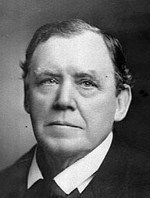|
| Affiliation | People's |

|
| |
1895-00-00 |
|
|
| Name | Ignatius Donnelly |
| Address |
Hastings, Minnesota , United States |
| Email | None |
| Website | None |
| Born |
October 03, 1831
|
| Died | January 01, 1901
(69 years)
|
| Contributor | The Oncoming Storm |
| Last Modifed | Juan Croniqueur
Mar 06, 2024 05:18am |
| Tags |
Irish -
|
| Info | DONNELLY, Ignatius, a Representative from Minnesota; born in Philadelphia, Pa., November 3, 1831; attended the public schools; studied law; was admitted to the bar in 1852 and commenced practice in Philadelphia; moved to Minnesota in 1857 and settled in Nininger, Dakota County; engaged in literary pursuits; Lieutenant Governor of Minnesota 1859-1863; elected as a Republican to the Thirty-eighth, Thirty-ninth, and Fortieth Congresses (March 4, 1863-March 3, 1869); unsuccessful candidate for reelection in 1868 to the Forty-first Congress and for election in 1870 to the Forty-second Congress; member of the State senate 1874-1878; resumed the practice of law; also engaged in literary pursuits.
Candidate for Vice President (Pop) 1900
Died in Minneapolis, Minn., on January 1, 1901; interment in Calvary Cemetery, St. Paul, Minn.
Ignatius Loyola Donnelly (November 3, 1831–January 1, 1901) was a U.S. Congressman, populist, and writer, known primarily today for his theories on the history of Atlantis and Shakespearean authorship.
Donnelly was the son of an Irish immigrant, Philip Carrol Donnelly who had settled in Philadelphia, Pennsylvania. On June 29, 1826 he married Catherine Gavin, a 2nd generation American of Irish extraction. After starting as a peddler Philip studied medicine at the Philadelphia College of Medicine. He later contracted typhus from a patient and died at age 31, leaving his wife with five children. Catherine Donnelly provided for her children by operating a pawn shop. Ignatius, her youngest son, was admitted to the prestigious Central High School, the second oldest public high school in the state. There he studied under the presidency of John S. Hart excelling primarily in literature. He then decided to become a lawyer, and obtained a clerkship under Benjamin Brewster, later Attorney-General of the United States. He was admitted to the bar in 1852. In 1855, he married Katherine McCaffrey, with whom he fathered three children. In 1855 he resigned his clerkship, entered politics, and participated in communal home building schemes. Becoming the object of rumors of financial scandal, he moved to Minnesota in 1857, where he settled in Dakota County. Together with several partners, Donnelly founded a utopian community called Nininger City. However, the Panic of 1857 doomed that attempt at a cooperative farm and community and left Donnelly deeply in debt.
Donnelly entered politics and was lieutenant governor of Minnesota from 1860 – 1863. He was a Republican Congressman from Minnesota in the 38th, 39th, and 40th congresses, (1863 – 1868) and a state senator from 1874 – 1878. As a legislator, Donnelly advocated extending the powers of the Freedmen's Bureau to provide education for the freedmen, so that they could protect themselves once the bureau was withdrawn. Donnelly was also an early supporter of women's suffrage.
After leaving the Minnesota State Senate in 1878, Donnelly returned to his law practice and writing. In 1882, he published Atlantis: The Antediluvian World, his best known work, detailing his theories concerning the mythical lost continent of Atlantis. The latter volume became a best-seller, and is widely credited with initiating the Atlantis mania that became such a feature of popular literature in the 20th century and contributed to the emergence of Mayanism. A year after Atlantis he published Ragnarok: The Age of Fire and Gravel, in which he expounded his belief that the Flood, as well as the destruction of Atlantis (and the extinction of the mammoth), had been brought about by the near-collision of the earth with a massive comet. This too became a best-seller, and both books seem to have had an important influence on the development of Immanuel Velikovsky's controversial ideas half a century later. In 1888 he published The Great Cryptogram in which he proposed that Shakespeare's Plays had been written by Francis Bacon, an idea that gained a popular following in the 20th century. He then travelled to England to arrange the English publication by Sampson Low, speaking at the Oxford (and Cambridge) Union after which his thesis "Resolved, that the works of William Shakespeare were composed by Francis Bacon" was put to an unsuccessful vote. The book was a complete failure and Donnelly was thoroughly discredited, requiring him to write in future under a pseudonymn. As well as writing, Donnelly made several other runs for public office during the 1880s. He made a losing run for Congress (this time as a Democrat) in 1884. In 1887, he successfully ran for the Minnesota State Legislature as an Independent. During this period, he was also an organizer of the Minnesota Farmers' Alliance.
Donnelly undertook a foray into national politics in 1892, writing the preamble of the People's Party's Omaha Platform. He was nominated for Vice President of the United States in 1900 by the People's Party. Also known as the Populist Party, the People's Party rose out of the national Farmers' Alliance movement and stood on a platform that called for abandonment of the gold standard (and later for free silver), abolition of national banks, a graduated income tax, direct election of senators, civil service reform, and an eight-hour day. That year, Donnelly also ran for governor of Minnesota but was defeated.
His wife Katherine died in 1894. In 1898, he remarried, wedding his secretary, Marion Hanson.
Donnelly died on January 1, 1901, in Minneapolis, Minnesota and is buried at Calvary Cemetery in St. Paul, Minnesota. His personal papers are archived at the Minnesota Historical Society.
[Link] |
|
| Start Date |
End Date |
Type |
Title |
Contributor |
|
| Date |
Category |
Headline |
Article |
Contributor |
|
|

